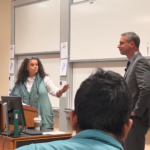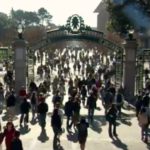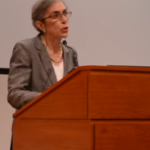What’s a Trigger-word Citizen to do?
This column is part of an ongoing series of essays examining and applying the timeless principles and truths of the Federalist Papers to the political events of our day.
What difference, at this point, do any of the recent scandals make? What ties them all together—IRS abuse, the Benghazi cover-up, and DOJ snooping—is the Obama Administration’s win-at-any-cost approach to the 2012 presidential campaign. Not for the first time, the President’s Chicago-style politics carried him over the finish line, with an able assist from the MSM journalists who seem only now to be awakening from a five-year slumber. Soon, no doubt, they will be repeating DNC talking points again: the election is over, the errors have been corrected, the guilty have been punished, and therefore, as they chanted throughout the Clinton years, “it’s time to get back to the business of the American people.”
What qualifies as the American people’s business has a lot to do with how one defines the American people, however. The clear lesson of these scandals is that, for progressives, there is no the American people, but rather two peoples who happen to inhabit the same territory. The first group is comprised of those loyal to the ruling class and the government it ultimately controls. During a Republican presidency, their dissent temporarily becomes the highest form of patriotism, but it is only the administration, not the permanent infrastructure of the modern bureaucratic state, that they oppose. The government, in this sense, they faithfully support regardless of electoral outcomes.
The second group includes all those “trigger word” citizens who associate too closely with terms the IRS doesn’t like: “Tea Party,” “Constitution,” “Patriot.” Their dissent from the dogmas of the ruling class, in questioning the morality and practicality of the government leviathan, represents the most dangerous threat to American society. They are loyal, in the Founders’ language, to the Union, not the government; a misplaced love making them worthy of close surveillance if not providing grounds for political divorce.
The distinction between Union and government is central to John Jay’s argument in Federalist 2, where he describes the Union as the foundation of American security and prosperity, essential for protecting the citizens’ rights and liberties. The Union established in 1774 by the Articles of Association was, according to Jay, only the formal expression of an organic unity binding the colonists to one another and to the land they had settled. God, it seemed, had purposed that a people joined together by common customs and political principles, inhabiting a territory easily navigable north to south and east to west, should be one.
The job of the Constitution, then, would be to “cement” this natural union by reinforcing its natural bonds. What God had joined together no man could rightfully separate—which is why Jay sharply criticized those who argued for breaking up the Union during the debate over the Constitution. But it is also why he approved the calling of the Continental Congress as the first step toward escaping the tyrannical British government and why he approved the calling of the Constitutional Convention as the first step toward replacing the inadequate Articles of Confederation.
Jay’s loyalty, in other words, was also to the Union, rather than the government. A government that promoted the good of the Union was a useful means to a more fundamental end. But, of course, it would make no sense to sacrifice the end for the means. Thus, a government that undermined the Union—or threatened its existence altogether—had to be altered or abolished, according to the severity of the case.
Whatever the particular beliefs of its contemporary members, the Progressive movement emerged in a post-Darwin world whose intellectual elites considered traditional religious faith impossible. Recognizing, nevertheless, the deep human need for fellowship or fraternity (best met historically by the church), they sought to build a state that would do more than secure to each a “square deal”—one that would, instead, create a national brotherhood under the tutelary leadership of a paternal elite. Since nature and circumstance advantaged some individuals over others, this community could only be brought into being if the state employed its powers in a discriminatory manner to secure the equality of all.
Progressive intellectual giant Herbert Croly understood that the government’s employment of such discriminatory means might breed disunity. Yet its benefits far outweighed any harm done, especially if progressive leaders understood that “the essential wholeness of the community depends absolutely on the ceaseless creation of a political, economic, and social aristocracy and their equally incessant replacement.”
The problem with Croly’s thesis is that no ruling class desires to be replaced. Hence the Obama Administration, like other progressive administrations before it, labors for a progressive harvest that is never completely gathered. Recall “Julia,” the fictitious woman featured in a key reelection campaign ad. Disconnected from all family life and social institutions, she finds her true self only in relationship to the government which guides her through each of life’s trials. Or consider the claim at the Democratic National Convention that government is the only thing that we do together.
In essence, President Obama ran for reelection as the representative of a ruling class that claims the absolute loyalty and, in the language of Federalist 2, the “blind approbation” of the American people as the debt that is due for its provident care for them. Those who resist are accused of offering only “blind reprobation,” while looking for the monster tyranny under the bed of every government bureaucracy.
As President Obama put it in his ill-timed Ohio State commencement address, just days before the IRS scandal broke, “Unfortunately, you’ve grown up hearing voices that incessantly warn of government as nothing more than some separate, sinister entity that’s at the root of all our problems; some of these same voices also doing their best to gum up the works. They’ll warn that tyranny is always lurking just around the corner. You should reject these voices. Because what they suggest is that our brave and creative and unique experiment in self-rule is somehow just a sham with which we can’t be trusted.”
Naturally, it would be a lot easier to reject such voices if the government weren’t threatening leaders of nascent Tea Party groups with jail time for not disclosing their group’s reading list.
But there are few in the Tea Party movement who truly fit President Obama’s description. They oppose today’s government when it undermines “self-rule,” when it makes a “sham” of the first principle of the American founding. President Obama and those of like mind deny the legitimacy of such dissent because they misidentify ruling class government with self-government. Thus, those who question the Administration’s account of Benghazi, read the Constitution too carefully, or poke around where they aren’t wanted, are just trying to “gum up the works”–to deny Americans the blessings of the Progressives’ beneficent project. The founders saw such citizens in a different light. They understood that the peace and prosperity of the American people depends upon an active citizenry that knows its Constitution, a well-informed public that knows its enemies, and a press that asks awkward questions.
Just as government makes a poor substitute for a church, it also makes a poor substitute for a political community. A government may be able to win the idolatrous devotion of an infantilized population of dependents, but “trigger word” citizens rightfully demand something more, even when it comes with unwanted scrutiny and harassment: a Union worthy of their political affections, securing room for them to pursue their higher duties to God and the good of their neighbor.
David Corbin is a Professor of Politics and Matthew Parks an Assistant Professor of Politics at The King’s College, New York City. They are co-authors of “Keeping Our Republic: Principles for a Political Reformation (2011).”




